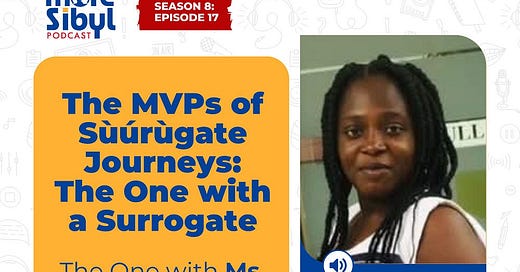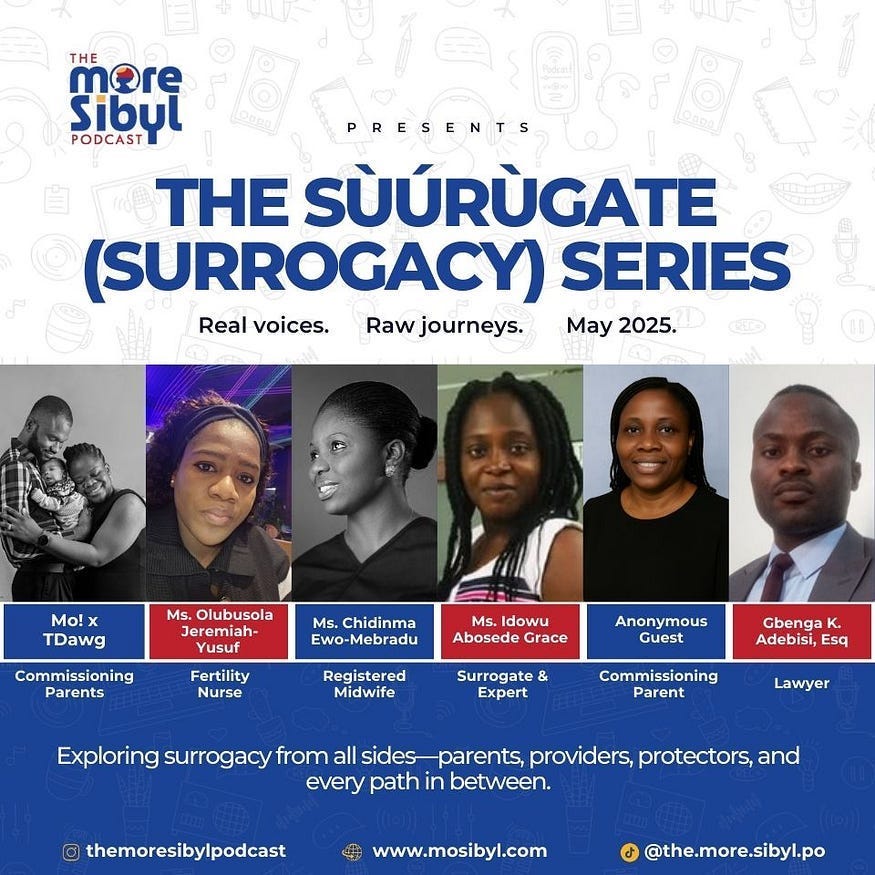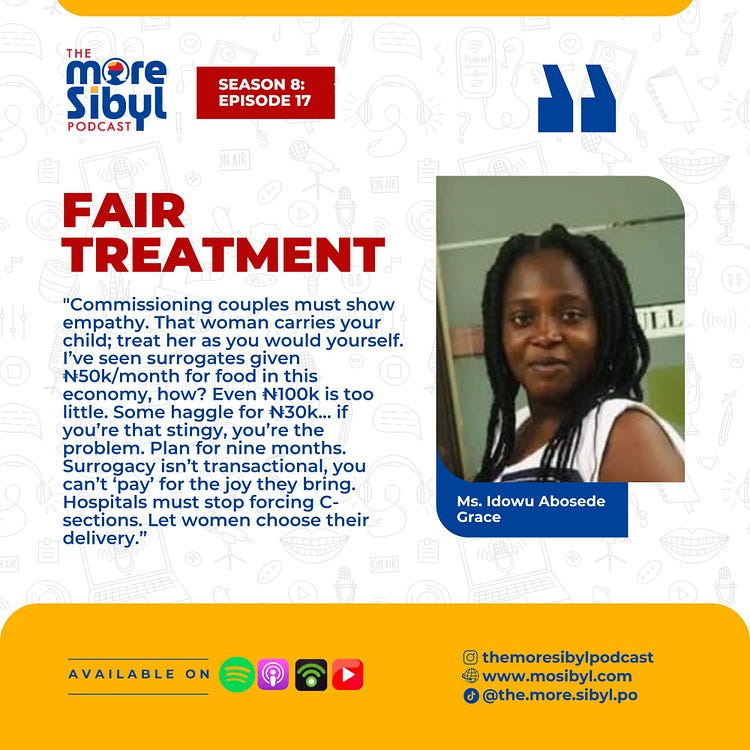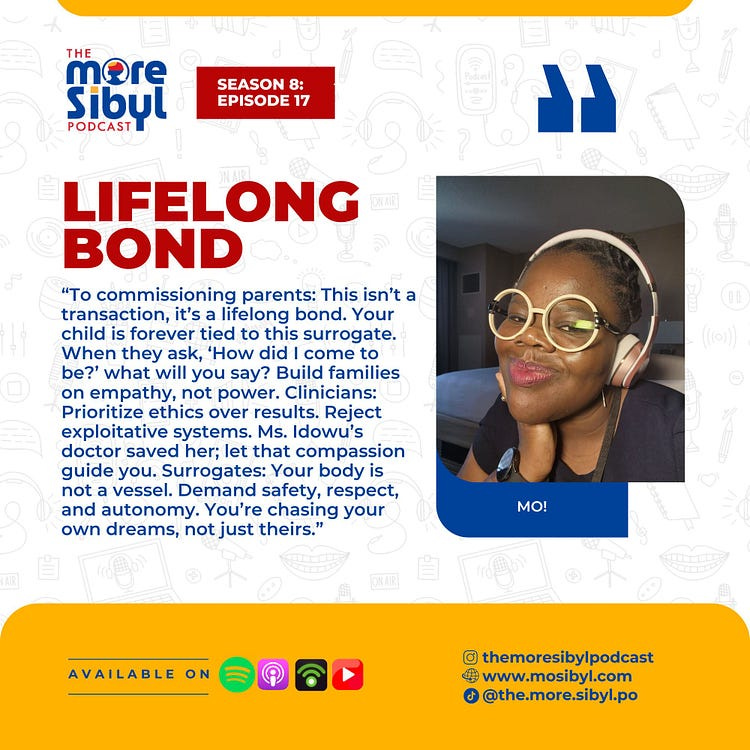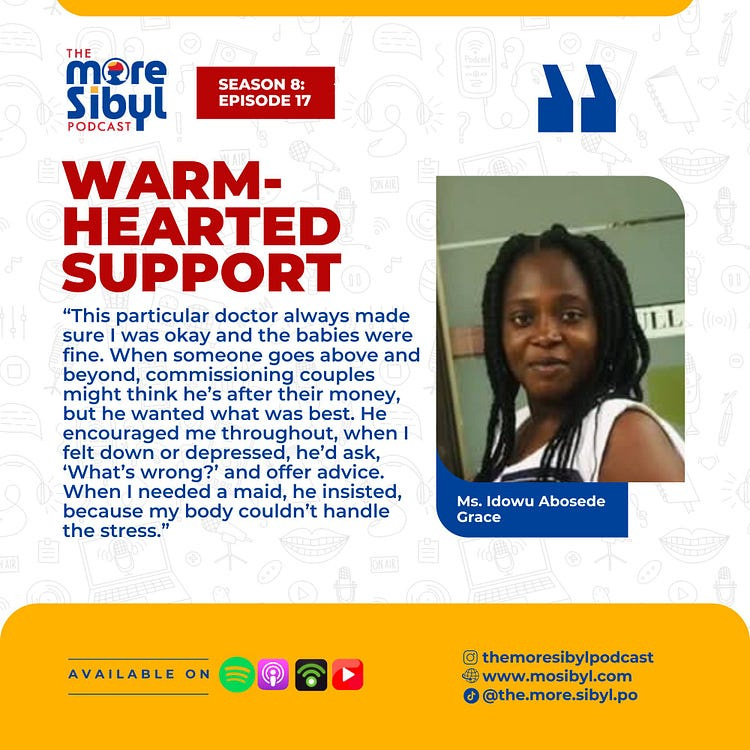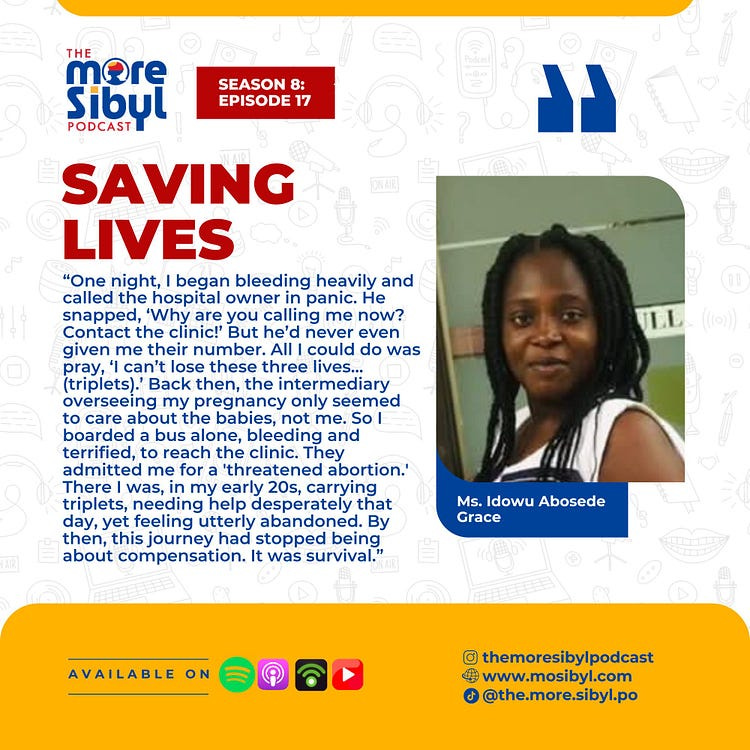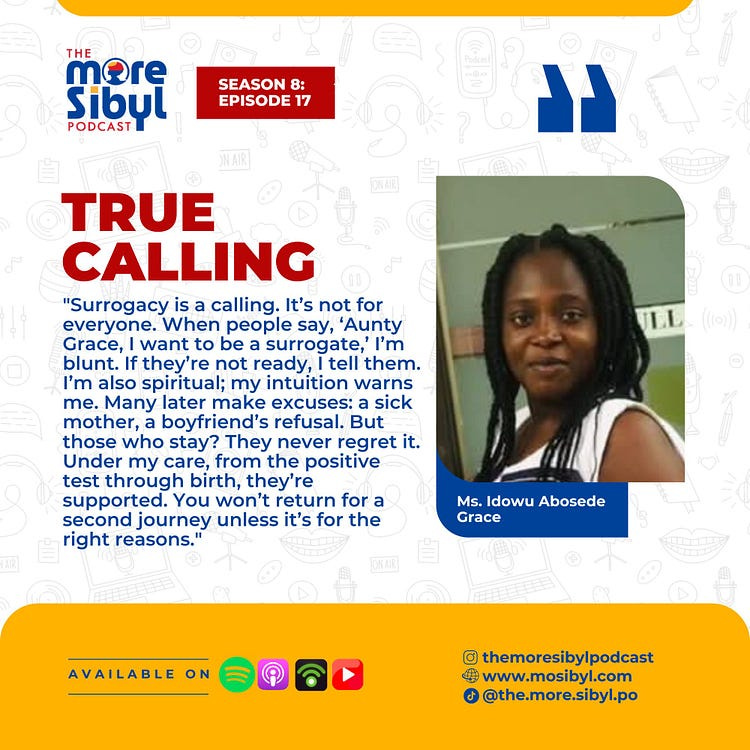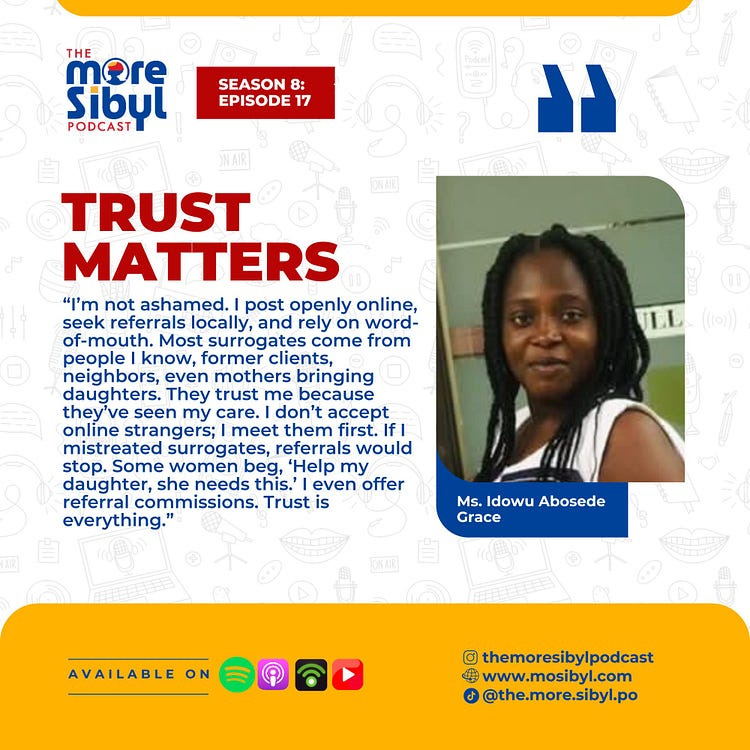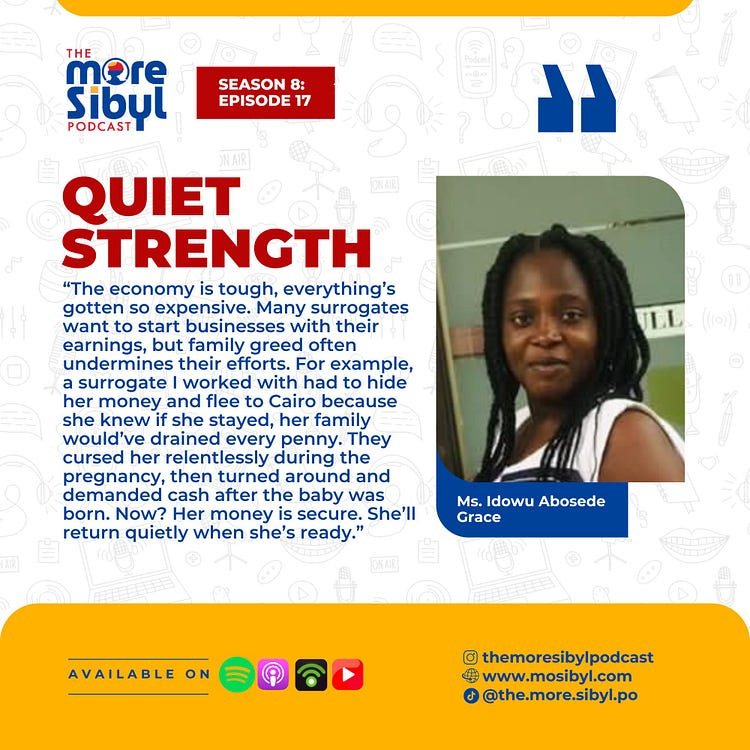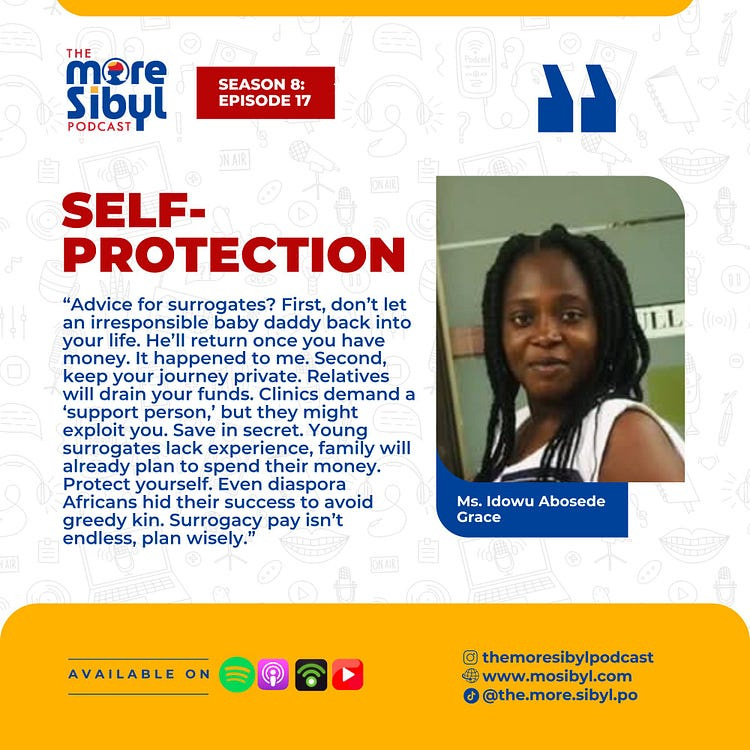The MVPs of Sùúrùgate (Surrogate) Journeys
서로를 품다| The One with a Surrogate | Episode 17 (2025)
DISCLAIMER:
This episode contains heavy themes — a heads-up to anyone who may be emotionally fragile or easily triggered.
“My passion for surrogacy began in Ṣomọlú. A neighbor fought with a woman she’d housed over egg donation, accusing her of ‘selling her eggs to ritualists.’ I wondered: Why would someone need this? I later realized it wasn’t about money, it was about helping others. A clinic agent recognized my drive and mentored me. Surrogacy isn’t just transactional. When intended parents ask for help, it’s often after enduring immense pain. I started my agency to honor that, ensuring this journey is safer for both parents and surrogates.” —Ms. Idowu (2025)
Meet the MVPs: What Does It Take to Carry a Life You Won't Keep?
What does it take to carry a life you know you won't keep? Surrogacy challenges our definitions of motherhood, sacrifice, and love. In today's post, we step into the world of one woman who chose to walk that path — and let her take us behind the scenes of one of the most selfless journeys imaginable.
When most people think about pregnancy, they think about baby names, nursery colors, and tiny clothes. But for Ms. Idowu Grace Abosede, pregnancy was about giving someone else the chance to experience that.
We unpack her personal journey through surrogacy. She literally had to use her body to learn the realities of being a surrogate, the hard way. That experience became the foundation for building her own agency, Boblu'nd Gray Surrogacy Agency. She shares the emotional and physical toll it takes, and the wide gap in protections for surrogates in Nigeria.
Ms. Idowu shares hard truths about the critical role of empathy from commissioning parents and the exploitative behaviors she witnessed from individuals and institutions. She talks about the financial mistreatment of surrogates, including being offered as little as ₦30,000 a month for feeding. In this T-Pain era!
We discuss her vision for ethical surrogacy, where surrogates are treated with dignity and supported throughout their journey. Ms. Idowu also calls out hospitals that routinely enforce unnecessary C-sections on surrogates and emphasizes the need for medical professionals to prioritize ethics and informed consent.
Whether you're a potential surrogate, an intended parent, or a healthcare provider, this episode challenges you to reimagine surrogacy not as a transaction but as a relationship built on trust, care, and accountability. You really want to hear this conversation!
This is part 3 of our 5-part Sùúrùgate series. Let me bring you up to speed if you're joining us and wondering what Sùúrùgate is all about. This series is as raw as it is necessary. We've been unpacking the complicated, emotional, and often unspoken realities of surrogacy, primarily through African, diasporic, and cross-cultural lenses. The name Sùúrùgate is a blend of "surrogate" and "sùúrù," the Yoruba word for patience — a fitting reflection of the patience this journey demands.
In the first two parts, I opened up about my personal experience with surrogacy and sat down with some incredible people who walked that road with me. If you haven't already, I encourage you to go back and listen. Here are the links to the first and second episodes to catch up.
Today, we shift the spotlight. We're hearing from someone who's lived this story from a completely different angle: Ms. Idowu Abosede-Grace. Her journey from the streets of Shomolu to becoming a surrogate and eventually founding her own surrogacy agency in Nigeria is nothing short of remarkable.
An Angel from Shomolu
Let me introduce our guest. Ms. Idowu Abosede-Grace is the CEO of Boblu'nd Gray Surrogacy Agency. She's someone who has lived the journey of surrogacy in Nigeria firsthand. Born and raised in Shomolu, Lagos State (just like me!), Ms. Idowu is deeply grounded in her roots, and it was in that very community that the seed of her future work was planted, though in a most unexpected way.
Ms. Idowu is the first child of her parents, with four siblings — three sisters and one brother. Growing up in a community where surrogacy wasn't openly discussed, she first encountered the concept through a situation that could've easily gone unnoticed. A neighbor in her area had offered accommodation to a friend, who then introduced her to the idea of egg donation and surrogacy. But what could have been an informative opportunity spiraled into chaos. The friend, feeling pressured or perhaps misled, backed out of a clinic appointment due to a fear of selling her eggs to ritualists. The tension escalated to a public fight, attracting the attention of Ms. Idowu's father, known for his welcoming nature, who offered the woman a room to stay, even without knowing the whole story.
Ms. Idowu, ever curious, decided to dig deeper. She asked the woman what had happened and learned that the fight was over egg donation. Ms. Idowu kept the idea in her heart. Instead of fear, she saw how this could be an opportunity to help others. "I felt like… someone can use [this] to better their lives because they are trying to help somebody." She imagined what it would be like for someone to need an egg donor — how much pain and loss they must have endured to get to that point.
Despite warnings from her mother and aunties to steer clear of the families involved, Ms. Idowu decided to reach out to the woman again. She wanted to be shown the ropes; she tried to understand. That boldness led her to connect with a woman who ran a surrogacy agency and eventually became a mentor to her.
This mentor saw something in Ms. Idowu beyond a desire for money or convenience — she saw passion. Even when she wasn't given transportation fare to accompany surrogates to clinics, Ms. Idowu would still show up, committed to the process and the people involved. Her mentor affirmed it: "It's not about the money… It's about the passion you have for it." She told Ms. Idowu, "Grace, I'm not saying you're only going to be a surrogate; you're going to also own an agency." And so the seed was planted.
That was about 14 years ago, before Ms. Idowu even had her own child. She didn't become a surrogate then, but the spark had already been lit. That moment, that chaotic encounter, became the unlikely catalyst for a life's mission — to bring structure, dignity, and care to surrogacy in Nigeria.
When Life Pulls You Back to Purpose
Life has a way of leading us back to our true calling, and that's precisely what happened to Ms. Idowu. After stepping away from the surrogacy and IVF world, she tried to pivot. She took on jobs outside the field, aiming for something more stable. But nothing quite clicked.
She shared how those roles didn't fit, and just as things felt uncertain, her daughter was diagnosed with acute tonsillitis. Before they even clarified the diagnosis, the medical bills were already piling up. It was a financial drain that pushed her to reconsider her former path.
Desperate and determined, she contacted her old mentor to say she wanted to be a surrogate again. "I thought you ran from us," her mentor said. "I need money," she replied bluntly. Though she had walked away from surrogacy previously for religious reasons, her new perspective was grounded in necessity and empathy. "It's not a bad thing. I'm trying to help somebody."
Her mentor reminded her of the training she'd already received: "I've taught you already. You can find your way." And so, with clarity and conviction, Ms. Idowu returned to the world she once left. At the time, the demand for surrogates wasn't high. As a mother now, her outlook had shifted. She became far more cautious. Today, she firmly believes that surrogates should have more than one child of their own before beginning the journey. "When I did my own work," she said, "at least one child was the minimum. But right now, for me, I think it should be two."
This wasn't just a preference — it was rooted in the lived realities and risks. Ms. Idowu spoke candidly about the potential complications: infections, trauma, mental health challenges, and even the possibility of losing one's womb. "God forbid," she added, but didn't shy away from the truth. Having walked that road herself with only one child, her perspective now is clear: "You have to be sure you're done with having your own kids," she said. "Because something can happen that can destroy your chances of having more."
This belief now informs her agency's non-negotiable policies. For Ms. Idowu, this is about protection and dignity. She won't accept anyone with fewer than two children into her program. It's a rigid boundary based on wisdom, not judgment. What struck me most was how she invests in her surrogates' well-being. Her story is a powerful reminder: behind every policy, every rule, every agency, there's a person who has lived the risks — and is determined to shield others from the same.
Redefining Surrogacy: Why Advocacy Matters
When my husband and I finally decided to pursue surrogacy, it wasn't a decision we made lightly. After 11-12 years of marriage, multiple IVF failures, heartbreaking miscarriages, and countless consultations, we walked into a doctor's office once again. This time, it was a Nigerian doctor whose approach felt markedly different. I was deeply concerned about how surrogates were being treated — what safeguards were in place, what support they received, and why there seemed to be so little dignity in the process.
That moment marked a turning point for me. I realized that in the urgency and desperation many people feel to become parents, it's easy to forget that the surrogate is more than just a means to an end. She's a whole person, carrying life, our child, on our behalf. That understanding reshaped how we approached our surrogacy journey. With the support of my incredible team, including Chidinma (who introduced me to our guest) and our dear friend Busolami, a nurse, we worked intentionally to do things differently. That meant paying our surrogate extra, ensuring she had access to mental health counseling, regularly checking in on her well-being, and even helping her with a business plan. You can listen to how we did things differently in our last episode. We discovered how many surrogates in Nigeria are vulnerable women, doing this for survival. It's a system that too often allows the rich to exploit the poor, and we refused to be part of that. If someone is giving me a gift I couldn't give myself — even with all the money in the world — the least I can do is honor her, not just during the pregnancy, but long after the baby is born.
This drives my passion behind this series — to encourage commissioning parents to do better. So I asked Ms. Idowu about her own experience as a surrogate, especially knowing her motivation was to pay for her daughter's medical treatment. I wanted to know how she protected herself from being exploited.
Her response was sobering.
Her first experience with surrogacy was far from pleasant. In her words, it was like she "used herself to gain experience" — a hard lesson learned.
Ms. Idowu's first surrogacy experience was challenging. Without proper guidance or support, she had to navigate much of the journey alone, learning hard lessons. She faced substandard medical care, emotional isolation, and even hostility when she advocated for herself. Despite promises of assistance, she was often left to manage emergencies by herself, physically and emotionally drained while carrying triplets in her early twenties.
At one point, she began bleeding heavily in the middle of the night. Scared and alone, she called the clinic's owner, only to be scolded for reaching out at that hour. She had no emergency contact. The only thing she could do at that moment was pray. "It wasn't about the money; this was about three lives!" The next morning, she had to get herself to the hospital.
Her health deteriorated rapidly as the pregnancy progressed, with constant contractions, leaking fluid, and hospital stays that left her body resistant to pain medication. Eventually, she delivered the babies at 32 weeks via C-section. After delivering prematurely, she didn't see the babies, as per the surrogacy agreement.
It was a haunting moment — hearing her say she didn't feel any way about not seeing the babies. "That was what we signed up for, now," she said. Her tone was flat but firm. Even when I pushed gently, wondering about the emotional toll or physical trauma from the birth, she said, "It doesn't matter. That's why surrogacy is not just a job, it's a calling. It's just not something somebody can do."
That line stuck with me: Surrogacy is a calling. Not just an arrangement. Listening to her, I was reminded again why advocacy in surrogacy matters so much. This isn't just a transaction. It's a life-altering journey for everyone involved. And if we, as commissioning parents, truly value the life being carried, we must also value the one holding it.
Even after the delivery, her ordeal wasn't over. She developed acute appendicitis, another complication from an already grueling pregnancy. When she contacted the intermediary nurse for help, the response was crushing: "The couple has spent their money already. Go and spend yours."
"I cried that day," she told me.
Left to fend for herself, she had to cover the cost of antibiotics and treatment out of pocket. But amidst the disappointment, there was a silver lining — a compassionate doctor who had supported her throughout the surrogacy journey refused to abandon her afterward. He stayed by her side, ensuring she got the care she needed. I felt a deep sense of gratitude just hearing about him. In a system that often treats surrogates as disposable, his commitment to her well-being was nothing short of extraordinary.
Surrogacy Is a Calling, Not Just a Job
Over the years, Ms. Idowu has built a strong reputation, and now people often come to her saying, "Auntie Grace, I want to be a surrogate." But she doesn't sugarcoat anything. "I'm very blunt," she told me. "To the extent that I don't have a lot of friends. The ones who can tolerate me are very few because I don't take nonsense." She's not in the business of telling people what they want to hear — she tells them what they need to know.
That honesty extends to how she vets potential surrogates. "Sometimes, just by looking at someone—or even without looking—my spirit already knows this person is not ready." She listens, she observes, and she trusts her intuition. Even when someone insists they want to be a surrogate, she often knows they're unprepared. "They'll say, 'Yes ma, I want to do it,' and one week later, they're calling back with stories: their mother is sick, their sister isn't well, their grandmother died. All sorts of excuses."
For her, surrogacy is not simply about the physical commitment — it requires emotional, spiritual, and mental readiness. She's prayerful about who she accepts and holds the process to a sacred standard. "It's a calling," she repeated. "Not everybody can do it."
But for those who do go through the process under her care, she stands by a powerful promise: "There's nobody who comes to me for surrogacy that regrets it." She's tested every part of this journey on herself — she's used her own body as the proving ground — and now, she sees it as her mission to ensure no woman under her watch suffers needlessly.
"As soon as the pregnancy is confirmed positive, till you give birth, you will not regret being a surrogate under me," she declared with conviction. And if anyone does return for a second surrogacy journey? "It should be for a reasonable reason, not because the money has finished again." Listening to her, I felt the weight of her experience and the depth of responsibility she carries. For Ms. Idowu, surrogacy isn't a transaction. It's sacred work.
Building a Sanctuary: Why Surrogates Come First at Boblund & Gray
Next, we spoke about her agency — Boblund & Gray — how it came to be, and the inspiration behind its founding. It was her second surrogacy journey, she told me, that truly lit the fire within her. "That was what really made me look at it," she said. "I knew I had to do better and have my own agency." If she had been running her own agency back then, she believed the experience wouldn't have turned out as badly as it did. So, she built something better—something safer.
Boblund & Gray, as she describes it, is intended to be a sanctuary—a place where surrogates are protected, heard, and honored. Not only are their rights safeguarded, but those rights are actively fought for. She emphasized that her mission is to ensure every surrogate's safety, well-being, and dignity, from beginning to end. And while she acknowledged that surrogates, like anyone, can misbehave, that never excuses commissioning parents from doing their part. "Do your own part," she said plainly.
One of the most striking things she said, unapologetically, was: "Our surrogates are a priority to us, even more than the commissioning couples." That might sound controversial, but she explained why. "The commissioning couples come and say they need a surrogate, and after everything, some feel like they've just paid them off. But no amount of money can pay a woman to give birth to a child."
To Ms. Idowu, the surrogate isn't simply carrying a pregnancy — she's ushering life into the world. Someone else's child. That's sacred work. And if commissioning parents don't ensure that the woman doing that work is cared for — physically, emotionally, and financially — the entire process can fall apart. "We make our commissioning couples understand that these surrogates are as important as the babies they're expecting from them," she said.
That mindset doesn't just impact one journey — it sets the tone for all future ones. When a surrogate feels protected and respected, she's far more likely to speak positively about the agency, to recommend it to others, or even consider taking the journey again. As Ms. Idowu put it, "The way we treat them also makes it easier for them to come back to us — or recommend other potential surrogates."
In a country like Nigeria, where federal protections for surrogates remain virtually nonexistent, what Boblund & Gray is doing feels radical. It's not just an agency that matches couples with surrogates — it's a blueprint for how surrogacy should be done. With compassion. With care. With dignity.
Sourcing with Integrity: How I Find and Vet My Surrogates
Finding her surrogates was another aspect I was curious about. When I asked Ms. Idowu how she finds her surrogates, her answer was clear and proud. "I'm not ashamed of what I do," she told me. That confidence is a big part of what fuels her approach. She's not hiding behind closed doors or operating in the shadows — her work is open, transparent, and deeply rooted in her community.
She explained that many of her surrogates come through word of mouth. She tells people in her street, her area, and even on social media that she needs surrogates. But the most powerful referrals come from people who already know her — former surrogates, friends, and others in her network who trust her because they've seen how she treats the women under her care. "If I were not treating my other surrogates well," she said, "they wouldn't be recommending surrogates to me."
She shared an unforgettable example: a woman once brought her own daughter to her, asking if the girl could become a surrogate. "Please," the mother said, "she doesn't have anything, but I have money to take care of her. Help her out." That level of trust only comes when people genuinely believe in your integrity.
Ms. Idowu also gives commissions to those who refer surrogates, which she sees as a win-win. "Yoruba people have this proverb," she said, "if you help others, you help yourself." That mindset has created a ripple effect where one well-treated surrogate leads to another, and another.
Most of her surrogates are local, people who live close enough for her to monitor and support easily. That proximity matters a lot to her. Having her surrogates nearby makes running around, responding to emergencies, and staying hands-on throughout the process easier. As she put it, "It's going to be easy for me to run around and locate them."
In a world where surrogacy can often feel clinical or transactional, Ms. Idowu's method is deeply human. Her community, her relationships, and her reputation are at the heart of everything she does.
Here is the next section, Hard Truths About Money: Advice for Aspiring Surrogates, carefully refined while preserving the full length and integrity of your original text:
Hard Truths About Money: Advice for Aspiring Surrogates
Another area we had to dive into was how surrogates can protect themselves — financially and emotionally — within this system. True to form, Ms. Idowu's advice was brutally honest, unapologetically raw, and grounded in deep, lived experience. She didn't sugarcoat a single word.
She began with a point many might overlook: most surrogate mothers are single mothers. And from her own journey, she's learned tough lessons — lessons she now tries to pass along to others. The first thing she said was clear, with no room for misinterpretation: do not accept your baby daddy back into your life. "Someone has been irresponsible from day one," she said, "and he came back into your life when he sees you are now boxed up? He can never be responsible."
She spoke from a place of painful experience. When she received her first surrogacy payment, her daughter's father suddenly reappeared. The temptation to believe someone has changed is strong, especially when you're in a better financial place. But that temptation, she warned, can be dangerous. "You think the person has changed, but they haven't," she said. "And before you know it, the money disappears. Just like that."
Next, she emphasized a point that may seem counterintuitive to many: don't let your family know you're doing surrogacy. That, she admitted, can be difficult — and even painful. It goes against everything we're taught about leaning on our loved ones. But in her experience, too many surrogates lose control of their earnings because those closest to them begin to manipulate the situation. Her agency even tries to guide this aspect by requiring each surrogate to have a support system or guarantor in place — someone accountable, someone who won't jeopardize the surrogate's well-being.
She explained it this way: "They know how much you want to collect. It's just like you people in the diaspora — some of your family members don't even know you're abroad." That secrecy, she said, isn't about shame — it's about self-preservation. Because the moment people around you sense there's money coming in, they start planning how to spend it with you, or for you.
She shared one particularly harrowing example. One of her surrogates had confided in a friend who introduced her to Ms. Idowu. That friend later told her family. The surrogate's mother, who had previously cursed her for doing surrogacy, suddenly began asking for money. The pressure mounted quickly, and emotionally exhausted surrogate finally told Ms. Idowu, "I will hide my money, I want to travel out." She did just that — hid her earnings and left for Cairo to work, determined to add to that money and build a life far from the draining demands of her family. Ms. Idowu said the woman doesn't plan to inform her family when she returns to Nigeria. She intends to move to another state and start anew.
And the truth is, surrogacy doesn't yield a massive payout — not in the context of Nigeria's rising inflation and the growing cost of living. But as Ms. Idowu said, the main reason many surrogates lose out isn't because things are expensive — it's because of the people around them.
Her advice was firm, practical, and delivered without sentimentality: working as a team with your husband if you're married. If you're single, protect yourself. Don't let your ex back into your life. Don't disclose too much to your family. Have a concrete plan for your future, and guard it fiercely. "If not," she warned, "your money is gone."
Centering Compassion: The Change Surrogacy in Nigeria Desperately Needs
My final question for Ms. Idowu was about her hopes for the future of surrogacy, especially in Nigeria, where the landscape is still largely unregulated and deeply complex. Her answer was as clear as it was compelling: the most urgent change we need isn't only regulatory — it's rooted in empathy. For her, true reform starts not just with laws, but with the hearts of commissioning couples.
"Commissioning couples should have more empathy for surrogate mothers. They are humans. They are meant to be well taken care of," she said. She painted a powerful picture: imagine carrying a child that isn't biologically yours for nine months — putting your entire life on hold, relinquishing your body to a grueling process — and then being told that 50,000 Naira for monthly feeding is too much. That wasn't hypothetical; it was a real experience. And today, with soaring inflation, even 100,000 Naira barely covers basic food expenses — yet some commissioning parents still resist.
She shared how she has had to argue with couples who wanted her to find surrogates willing to accept just 30,000 Naira per month. "That's peanuts right now," she said flatly. And then she added something that hit home: "If a man can treat a surrogate that way, chances are he's not treating his wife much better."
But it wasn't all bleak. She also expressed gratitude about the couples she's currently working with — people who listen and understand that pregnancy is not just a transaction. These couples get that a surrogate's well-being is directly tied to the health and safety of the baby. That shift — from transactional thinking to human-centered care — is the model she hopes will catch on.
For Ms. Idowu, surrogacy must be planned holistically. She urged commissioning couples to think beyond the delivery and plan for nine months. Monthly allowances shouldn't be considered optional or negotiable — they're essential. And support shouldn't end at childbirth. If your surrogate develops complications, as she did during her first experience, then your duty of care should extend beyond the delivery room.
She also brought up a deeply troubling issue: the medical practices around surrogate births in Nigeria. She noted that hospitals often enforce cesarean sections for surrogate deliveries, regardless of medical necessity. "This isn't how it's done abroad," she said. In places like the U.S., for example, C-sections are typically reserved for medically indicated cases or multiple births. Single pregnancies can still result in vaginal deliveries, and most importantly, the surrogate is given a voice in the process.
While she acknowledged that cesareans are valid and sometimes necessary, they should never be forced. "Surrogates should have a choice unless there's a complication," she insisted. She's seen cases where surrogates struggle to conceive naturally afterward. "We don't know — maybe it's because of the cesarean section," she said. "But you can't exclude that."
This wasn't just a critique of policy — it was a plea. A heartfelt call for better treatment, for stronger systems, and most of all, for a shift in how surrogates are perceived. She's not asking for lifelong obligations or impossible standards — just for people to acknowledge the immense weight that surrogates carry, both literally and figuratively.
"You can't pay anybody for giving love, for giving joy," she said. "They are bundles of joy—things you have been looking for for years…and you see somebody giving it to you."
Whether or not policies change in the next five years, Ms. Idowu is clear on one thing: the future of ethical surrogacy in Nigeria rests in the hands of commissioning couples. It starts with compassion. It requires thoughtful planning. It demands dignity. And above all, it calls for seeing surrogates not as vessels, but as whole human beings — women of strength and worth.
Closing Reflections: Surrogacy, Power, and the Need for Radical Care
Speaking with Ms. Idowu in this episode reminded me that surrogacy isn't just about creating families — it's about how we treat people. It's about trust, care, and power dynamics that we don't often talk about. Surrogacy, especially in Nigeria, is more than contracts and costs. It's a mirror that reflects how we treat women, especially those from the margins, economically, socially, and medically.
Throughout our conversation, Ms. Idowu brought that humanity to the surface. She reminded us that surrogates are not just "helpers" in someone else's story. They're whole people with lives, dreams, and bodies that deserve safety, agency, and respect.
Empathy is non-negotiable. If you're financially able to go through surrogacy, then budget for the nine months of care, support, and well-being that your surrogate deserves. As she said, "Plan that nine-month journey with them." This isn't just a medical process; it's emotional, physical, and spiritual labor. And how you treat your surrogate will impact not just the pregnancy, but the story your child will inherit.
As we wrapped up, I felt the weight of her words and the urgency of her vision. So here's my charge to everyone listening:
To surrogates and those considering the journey, your body is not just a vessel. You deserve full understanding, safety, and support. Ask questions. Seek community. Prioritize yourself, always.
To commissioning parents, choose empathy over control. This is not just a transaction. It's a relationship. Whether you like it or not, the surrogate is part of your child's story. Build that story with care.
To healthcare professionals, you are gatekeepers of safety. Don't reduce this work to just outcomes. Let ethics and informed consent be your north stars.
And finally, I thank Ms. Idowu. Her honesty, advocacy, and example show us what's possible when we center care and accountability. If you haven't already done so, I strongly encourage you to listen to the full episode. Her story deserves to be heard in her voice — and trust me, it's one you won't forget. Till next time, keep your compassion strong, Mosiblings.
Till next time, keep your compassion strong, Mosiblings.
Considering Surrogacy or Global Family-Building?
HOPES (Helping Our People Expand Safely) offers culturally grounded coaching, resources, and community for families navigating surrogacy and CRBA (Consular Report of Birth Abroad). Join our safe, supportive space and get personalized guidance rooted in lived experience and care. Complete the HOPES Intake Form to get started and receive an invite to our private support group. Note: This is not a legal or medical service — just a compassionate first step toward clarity and empowerment.
🅻🅸🅽🅺🆂:
Download: https://mcdn.podbean.com/mf/web/kummbb3rgj4e8sqq/MVPSurrogate2025.mp3
Or on the website: www.mosibyl.com
Previously on the Suurugate series:
Find Mrs. Idowu on IG: https://www.instagram.com/boblu_nd_gray?igsh=MXgybDAxY2V2NHh3Nw==

